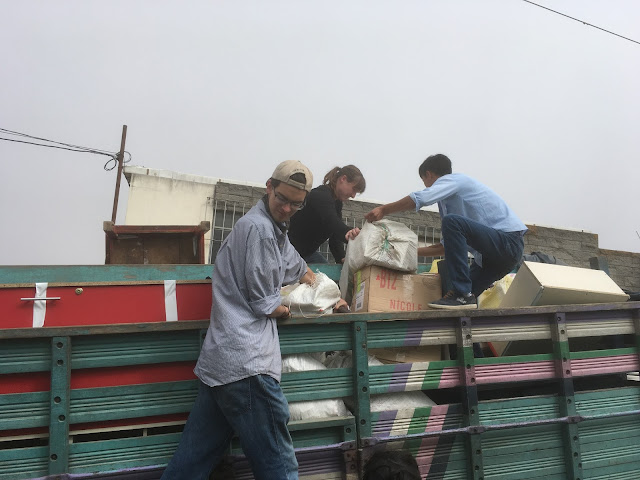Text and photos by Emily Rempel
This has been a
VERY exciting couple of weeks for our Family Support Center. After a long and difficult
search for a new location, we signed the papers last Monday for our new space and were ready to
start making it our own. On Tuesday a group of volunteers from
Pop Wuj and Pathways, an organization serving adults with developmental disabilities, headed out to the old FSC site in Llanos del Pinal. There we were met
by a big group of FSC mothers and several of their children.
Our first
task was loading all of the furniture and the piles upon piles of other FSC
materials up into the big moving truck. With many hands, and many trips, we
loaded up the benches, cabinets, tables, and chairs. Luckily we had some Tetris
experts on our team who were able to find a way to fit all of the awkward,
bulky furniture into the truck.
 |
| Jeremy, Ashley, and Santos search for any remaining free spaces |
On top of the furniture, we piled chairs, sacks of books, pots and pans, and a myriad of other odds and ends that all help the FSC run. By the end of it, the truck was just about overflowing. Then, once we got to our new FSC site, we had to unload it all!
With the first truckload
emptied, one group headed back to the old FSC site to pack up one more load,
including a stove and a great big swing set.
The swing set proved an
interesting challenge to get into the new Center and the process was truly an
impressive feat of strength and geometry.
In the end,
just about all of the furniture got moved without a hitch, with the exception
of one damaged cabinet. That, we can blame on the age-old problem of "too much cabinet -- not enough doorway."
 |
| Moving our shelving units was a team effort |
By the time 5 p.m. came around, we were done! A special thanks goes out to all of our little helpers...
 |
| Emmanuel inspecting the inside of our recycling bin, making sure everything looked up to spec |
 |
| One of Brenda and Ingrid's little cousins carrying our shelving unit (while teacher Santos helps just a tiny bit) |
On Thursday
we held a special benefit dinner for our Family Support Center, featuring some
top-notch burritos (which, as co-chef, I say with absolutely no bias) and a
margarita bar. At the dinner, we talked to the students a bit about what the
Family Support Center is, what it offers to the community, and why it's so
important. All proceeds from the night are going to be put towards our Family
Support Center.
We can't
say enough how incredibly excited we are to be starting this new chapter in the
life of our FSC, for it to be able to continue providing its vital services to families in Llanos del Pinal. Thanks for following this journey with us, for
reading about our work, and for supporting our projects.
Interested in helping us with this transition to a new site? Donations through Foundation Todos Juntos make a tremendous difference!
Interested in helping us with this transition to a new site? Donations through Foundation Todos Juntos make a tremendous difference!








